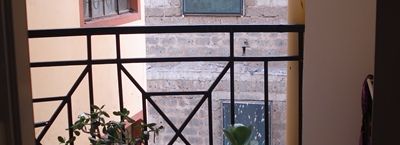L like in lamp

I knock on Nasra`s door (all names are edited) and call out my name. When I walk into the room, Nasra welcomes me enthusiastically. Her one-year old son Mohammed gives me a happy smile. Then we (my collegue and myself) sit down on the matress, that is placed on the floor - as is common in this refugee-culture. We chat about different things with Nasra, Sacdiyo and Salma and get to know each other better. All three are refugees and are longing for a better life in the USA or Canada.
Our literacy and English project has a comprehensive approach: We want the ladies not only to learn to read, write and speak English, but we also want them to learn to be able to make good and right choices for their families.
Today our theme is "Hygiene". We explain how different sicknesses can be avoided through keeping the hands clean and washing them often. We use pictures to explain the process of hand washing. These pictures show other refugee ladies washing their hands. At the end of our session, we give each lady a towel and soap.
After the presentation, we teach literacy to Nasra and Sacdiyo. The ladies already know some basics. I practice with the ladies words that start with the letter "L". Then they can mark the specific letter on a worksheet. I ask them to read other words that have an "L" in them and ask them to show me the picture that goes with the word. Sacdiyo is very excited and is quite proud of herself as she presents her homework to me. Right then a curious neighbor comes into the room and greets us rather shyly. Who knows, maybe she will be our new student?
Help for refugees in Nairobi
Show compassion overcome hinderances
Guleed (name changed) comes very sick into our clinic. Cancer has emaciated his body. Although the doctors do their best, it is quickly clear that he will die. His brother Sharmake visits him every day in the hospital. Finally, I get a call from Sharmake that Guleed died last night.
In the culture of these refugees, mourning and crying are a sin; for life and death are subject to the will of God. And yet I see tears in Sharmake's eyes. His religion prescribes that the dead must be buried within 24 hours. I accompany Sharmake to the corpse, and interpret there for him.
Other family members arrive. I express my condolences to them and they are grateful. Through the trust relationship we share with Sharmake, I become one of them in the time of death. When the African driver of the carcass asked who I was, they simply replied, "She belongs to us." It doesn`t count any longer that I have a different skin color and religion. What is more important is that I speak their heart-language and have walked the path of their suffering.
It is a privilege to be so close to people. In spite of suffering and sorrow, which I often experience here, I am grateful.
In the corridor of the clinic I meet Njeri, she is an African nurse. In the past she had a hard time to see the refugee patients. These were so different from their culture, language and appearance. There is often mistrust and misunderstanding. Njeri also went on like that for a long time: whenever she could, she had her colleagues treat the refugees. But that has changed.
Since February, she has been attending my language lessons where I am teaching the language and culture of the refugees. Since then, Njeri looks at them with quite different eyes and goes up to them to greet them in their mother tongue.
